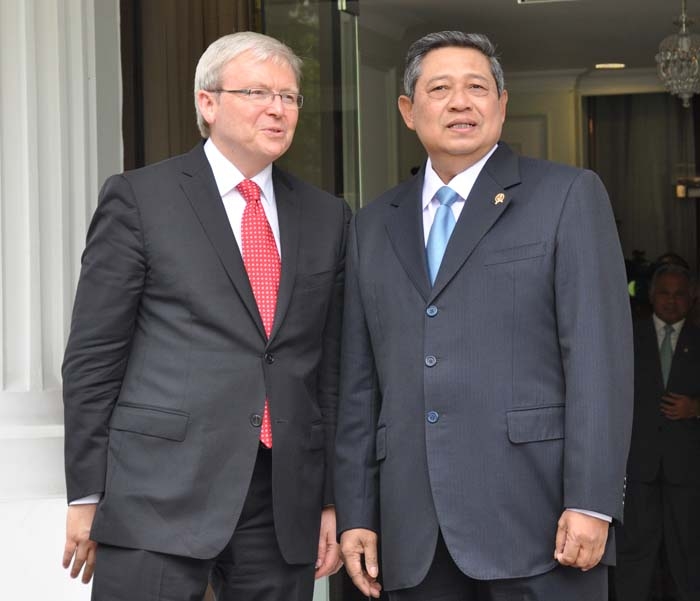
One wonders whose opinions the reportedly more consultative Kevin Rudd sought in advance of his press conference last week, when he speculated about confrontation with Indonesia under a Coalition government. ‘I am very concerned about whether if Mr Abbott became prime minister and continues that rhetoric and that posture and actually tries to translate it into reality I really wonder whether he is trying to risk some sort of conflict with Indonesia’, Mr Rudd said. ‘It’s not a good thing, it’s a really bad thing’.
Confrontation with Indonesia would be an unspeakably bad thing for any Australian government, but it’s difficult to see how that outcome would emerge from a difference of view over asylum seekers. The Australian Navy will always operate with the safety of individuals at sea as their prime concern, and no political direction can alter that. It’s simply misleading to imply that the unhappy and complicated asylum seeker issue could degenerate into war between Australia and Indonesia. The constant influx of boats carrying asylum-seekers makes the bilateral relationship difficult, but so too do differences over live cattle exports, the attitudes of some Australian NGOs on Papua, drug-mules and a range of other issues. The fact is that relations between the two countries remain on a positive track notwithstanding specific points of tension.
Here’s some good news: there’s largely bipartisan support for building closer and more effective relations with Indonesia. The 2013 Defence White Paper put a premium on closer relations with Jakarta, describing it as ‘our most important relationship in the region’:
Australia benefits from having a strong and cohesive Indonesia as a partner to our north, as Indonesia does from a secure Australia to its south. Geographic proximity means that Indonesia’s and Australia’s security interests are intertwined. We have a shared aspiration for the stability and economic prosperity of our region that underpins our partnership and is driving increased breadth and depth in our defence cooperation. (DWP 2013 (PDF), paragraph 3.17)
At the Shangri-La Dialogue last June, Indonesian Defence Minister Purnomo indicated the bilateral defence relationship was progressing well. He praised Australia for closely consulting with Jakarta on the white paper and offered to do the same as Indonesia updates its policy.
For its part, the Opposition has indicated strong support for the bilateral relationship. A Coalition policy statement released in January 2013 notes the opportunities Indonesian economic growth offers for Australia, commits to fast-track a free trade agreement with Jakarta, promises to avoid ‘damaging backflips’ like the suspension of the live cattle trade, and says that if Prime Minister Mr Abbott will make his first overseas visit to Indonesia. This positive approach has been summed up as ‘more Jakarta and less Geneva‘ in Coalition statements.
Both sides of politics claim to appreciate the importance of the bilateral relationship, and say that it’s a priority to deepen engagement. If the government and opposition really mean what they say, they should work harder to ensure that domestic wrangles don’t damage their bigger aspirations for the relationship. The reality is that both sides have an interest in making sure that relations with Jakarta are kept on an even keel through the election period so that whichever party wins power, a government with a new mandate can make Indonesia a priority.
What would be the right way to approach Indonesia in the lead up to our own domestic poll? Mr Rudd will visit next week, and it’s likely the Coalition will continue to make their own contacts in the weeks before the election. I suggest four key approaches. First, it’s important to not leave the Indonesians with an impression that either side of Australian politics is trying to enlist their support in a domestic spat. Jakarta, sensibly, will want to be able to deal with whoever wins office in Canberra. Domestic politics shouldn’t be exported.
Second, we must take the time to set out the bigger goals for the bilateral relationship. As I’ve written here, Indonesia doesn’t necessarily think its relationship with Australia is as critical to them as we’d like. We need to sell the positive case for close relations with Canberra, which will be built around economic links, trade and people to people ties. It’s pointless just hectoring Indonesians about why they should jump to address our interests.
Third, if the relationship is really critical to Australia, we should be prepared to put our money where our mouth is—by offering substantial incentives to change behavior around people smuggling. This could involve helping to equip and train the TNI Navy and Air Force with the wherewithal to patrol their waters. Large scale development assistance to build capacity in customs, policing, judicial and related areas would also assist. It’s worth remembering here the breakthrough moment in the bilateral relationship that took place when John Howard announced a billion dollar aid package in January 2005 after the tsunami devastated the Aceh Province. This was a defining moment which helped to overcome resentments from the East Timor experience. Big gestures can yield big rewards.
Finally, our Government and Opposition should approach their contacts with Indonesian leaders in a suitably low-key way. Megaphone diplomacy of the type associated with Prime Ministerial visits won’t help to deliver the types of cooperative and long-term outcomes Australia wants. The right approach would be for both sides of Australian politics to signal their willingness to be involved in a deep, sustained and closed door-dialogue after our election is over. If ever there was a need for some bipartisan consensus on an international issue, good relations with Indonesia is the critical one. References to Konfrontasi should be shelved and promises of continuity offered instead.
Peter Jennings is executive director of the Australian Strategic Policy Institute. Image courtesy of Australian Foreign Minister archive.

